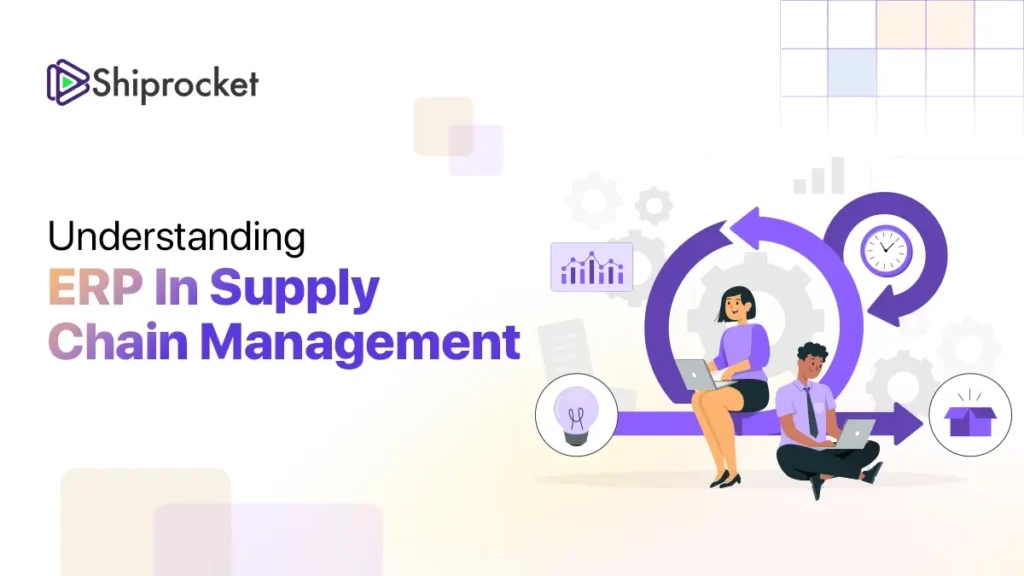5 Roles of ERP in Supply Chain Management
Efficient Supply Chain Management (SCM) is crucial for successful businesses of all sizes. Enterprise Resource Planning (ERP) in supply chain management allows businesses to optimise and manage complex activities, including demand planning and sourcing, manufacturing, and distribution of goods. What’s more? By integrating enterprise resource planning into SCM, businesses can meet customer demand while controlling additional costs.
An ERP system unites all the core business activities to improve overall operational efficiency. It automates specific processes and workflows seamlessly while integrating data and functions of different departments to act as a cohesive unit.
Let’s explore the role of ERP software in supply chain management.

Understanding the ERP System’s Role in Supply Chain Management
ERPs are elaborate software solutions that every business can use to manage different aspects of their operations. This would include overseeing the supply chain, assessing future demand for goods, locating resources, producing goods, and distributing them to clients.
Can ERP software do more? Well, key supply chain management can do tasks like:
- Planning,
- Purchasing,
- Inventory Management,
- Warehouse Management, and
- Order Administration
All these tasks are handled by modules in modern ERP systems. They allow businesses to plan, organise, and automate these processes while satisfying client demands. You can easily obtain a unified view of supply chain operations, financial data, and other crucial data. How is that possible, you ask? It’s because ERPs store all business data in a single database.
The challenges that are generally involved in integrating many apps to handle various supply chain functions are diminished or eliminated by this built-in integration.
- ERP systems also allow businesses to automate supply chain processes, saving time and money while lowering the risk of human mistakes.
- ERP module integration across different functions enhances corporate unit communication while boosting teamwork and productivity. For instance, having access to precise data on supply chain capacity, customer demand, and supplier contracts enables procurement managers to purchase the appropriate quantities of raw materials.
- Similarly, a comprehensive picture of supply chain performance enables logistics directors to identify areas for increased efficiency.
Integrating Supply Chain Management and ERP
The various benefits of ERP systems in SCM are becoming increasingly apparent to every business owner. ERP software is the perfect solution for managing business information, integrating various systems and working processes, and ensuring the best operational procedures.
ERP is critical to fight against workplace inefficiency and waste reduction and ensuring that employees may better focus their efforts. There may be some problems due to the various components of both systems working as a single unit. Ensuring you and your staff completely comprehend the function of ERP inside the SCM process is in the best interests of your business.
Advantages of Combining Supply Chain Management and ERP for Your Business
The benefits of an ERP system when combined with a supply chain management system include:
- Higher Efficiency
ERP systems enhance the effectiveness of the SCM processes in many ways. With the implementation of automation, businesses can optimise supply chain operations such as stock management and transportation schedules. This can free human resources for other essential business operations, improving the efficiency of the supply chain as a whole.
- Improved Visibility
ERP systems increase supply chain visibility so stakeholders can swiftly decide how to cut manufacturing, logistics, and procurement costs. This system enables better planning, faster production schedules, and more precise delivery date projections by integrating supply chain data and procedures. With this powerful tool, businesses can make better decisions on how to move resources around.
- Flexible Supply Chain Solutions
An effective supply chain must be flexible. Rapid changes in supplier capacity, shipping lanes, and customer demand must be immediately detected and addressed by businesses. Companies can detect and handle possible hazards with predictive analytics and scenario planning tools before they impact operations.
- Eliminating Bottlenecks
Poor planning makes it difficult to obtain resources at the appropriate time, which results in a lack of inventory and industrial bottlenecks. ERP systems assist businesses in locating possible bottlenecks, alerting the teams concerned, and allocating the necessary resources to maintain production capacity and continue on-time order delivery to customers.
- Minimised Operating and Overhead Expenses
Companies can streamline inventory by buying just enough products to meet consumer demands without overstocking, with greater supply and demand visibility. This may save money and free up a lot of warehouse space. Automated procedures also cut down on administrative expenses and mistakes that can have expensive ripple effects across the supply chain, such as ordering the incorrect quantity of raw materials.
Steps to Implement ERP Software with Shiprocket for Your Next Move
eCommerce operations can be streamlined by integrating Enterprise Resource Planning (ERP) software with Shiprocket. This can be done by following the below mentioned steps:
- Select an ERP System: The first step is to select an ERP system that works without any glitches and is compatible with your business’s needs. Microsoft Dynamics and SAP are some of the most commonly used ERP platforms nowadays.
- Understanding Shiprocket’s Integration Capabilities: As you consider different integration options, Shiprocket provides an API interface, making it simpler to integrate your ERP system and hence can help you scale on your demand.
- Establish Integration Goals: Establish the objectives of integrating an ERP system with Shiprocket. Automating order processing, inventory control, and shipping label production are common needs of most businesses.
- Data Preparation: Ensure that the data in your ERP system is precise and has been configured properly. This includes product details, stock levels, and customer information.
- Integration of API: Connect your ERP system with Shiprocket’s API with the help of integration documentation provided by Shiprocket.
- Testing and Training: Test your entire integration process to ensure that all your controls and processes run smoothly without creating any issues. When implementing the ERP system, training your personnel to understand and use the system is crucial.
- Streamlining your ERP System: Continuously improving the integration of the ERP and SCM systems helps increase efficacy and performance. Keep an eye on important statistics like inventory precision and order processing times to ensure your systems are working properly.
- Maintenance and Support: Connecting with Shiprocket regularly is necessary to ensure all the updates are made and there are no glitches while using the ERP and SCM processes.
Conclusion
Enterprise Resource Planning (ERP) systems are an innate part of every business. They help businesses understand how to use their resources most effectively to maximise efficiency and enhance profits. ERP systems also help with planning, sourcing, and purchasing while providing greater global visibility. Shiprocket helps you integrate your business with an effective and powerful ERP software that allows you to seamlessly carry out all your business operations. They also ensure continuous improvement of their ERP system to keep up with the dynamic demands of the supply chain. Gain better visibility and improved work processes by choosing Shiprocket’s solution today.
ERP software makes the supply chain more efficient, easy to manage, and scalable. It helps businesses streamline and automate supply chain processes and gain more visibility.
There are several factors influencing the successful use of ERP software. These include proper training, management support, due diligence, setting clear project goals, easy adoption, timeline planning, and more.
ERP software can help supply chain managers in several ways. These include data integration, streamlining key processes, improving visibility, managing procurement, accelerating manufacturing processes, and demand forecasting.
The key KPIs for ERP implementation in supply chain management include inventory turnover, order fulfillment rate, and lead time.








